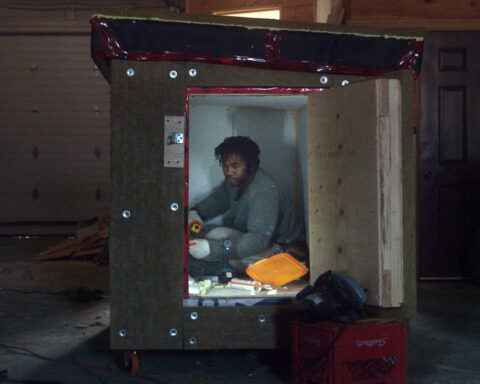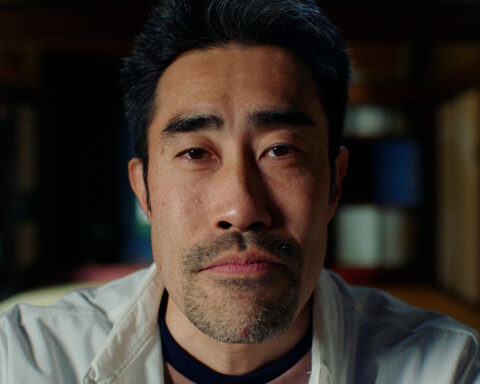Ray & Liz
(UK, 108 min.)
Dir. Richard Billingham
By Daniel Glassman
Richard Billingham made his name as a photographer just over twenty years ago with Ray’s A Laugh, an exhibition and photobook of pictures of his working-class British family. It’s an epoch-defining work that has been hailed as magnificent and denounced as voyeuristic. Ray, Billingham’s father, was an alcoholic who seemed to subsist entirely on a diet of terrible homebrew made by his neighbour. Liz, Billingham’s mother, overweight and covered in tattoos, spent most of her time smoking cigarettes, doing jigsaw puzzles and collecting tacky stuff that is strewn around her apartment. There’s Jason, too, Billingham’s younger brother, who was in and out of foster homes. The pictures themselves were initially taken as studies for Billingham to paint, but became the art itself when mentors found out about them. They are lurid, somewhat in the manner of Nan Goldin’s Ballad of Sexual Dependency though with an untrained intimacy, which led to accusations of exploitation somewhat in line with those leveled at Billingham’s contemporaries among the Young British Artists of the late 90s. The book was a sensation and Billingham won the prestigious Deutsche Börse photography prize for it.
Ray & Liz, Billingham’s first fiction film, takes off from the same place as Ray’s A Laugh. It’s a tightly composed triptych with episodes about Ray as an old man, alone with his drinks and thoughts, but for brief visits by his homebrewer neighbour and his estranged wife Liz; Billingham’s uncle Lol, a childlike alcoholic who is taken advantage of by a psychopathic boarder; and Jason as a child neglected by his parents running away without anybody much noticing or caring. Just as with Ray’s A Laugh, Ray & Liz is at once shocking and terribly familiar. It’s also done with incredible skill. The look is very different to that of Billingham’s photographs—a sign of a fruitful collaboration with cinematographer Daniel Landin. Where Billingham’s photos are raw, Ray & Liz is almost classically elegant, calling to mind the perfectly composed claustrophobia of Bresson’s A Man Escaped. The script is similarly minimal without being minimalist per se, more Raymond Carver than Beckett. Shocking scenes abound, which I won’t ruin here, but I was most impressed with the ending, which is as quietly devastating as any I can remember.
I do mean those comparisons to carry as much praise as they seem to. Ray & Liz is an astonishing film. It packs all the quiet intensity of early Terence Davies. And though it refuses, wisely I think, to expand the lens to take in broader social, political and economic trends, its value as a fly-on-the-wall piece about downwardly mobile white people in the Brexit era is clear. But it is mostly about the dramas of ordinary lives spiraling out of control, and in its relentless attention to that, it is almost unbearably poignant.











